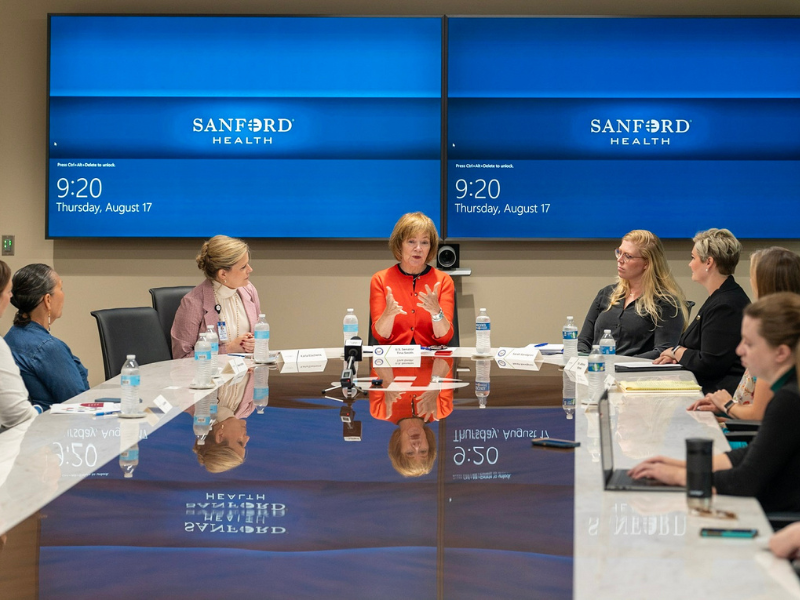U.S. Senator Tina Smith (D-MN) recently convened a roundtable with front-line health care providers and leaders at Sanford Bemidji Medical Center to discuss efforts to expand access to maternal health care across six counties in northern Minnesota.
In 2021, Sanford Health of Northern Minnesota received $3.67 million in federal grant funding for the Rural Maternity and Obstetric Management Strategies (RMOMS) program, in partnership with Cass Lake Indian Health Service, Red Lake Indian Health Service, Sanford Medical Center Fargo, PrimeWest Health, Beltrami County Health and Human Services and Scenic Rivers.
"Access to maternity care shouldn’t be limited by who you are or where you live." U.S. Senator Tina Smith (D-MN)
The Families First: Rural Maternity Health Collaborative is focused on improving access to prenatal, obstetric and postpartum care and reducing disparate outcomes for women living in rural, underserved and tribal communities. Native American women living in rural areas are twice as likely to receive late or no prenatal care and have double the rate of perinatal mortality as white women.
Leading with maternal health outcomes
“We’re bringing care to where women are,” said Dr. Johnna Nynas, an OB/GYN at Sanford Bemidji Medical Center, who participated in the roundtable discussion and was the lead author on the RMOMS grant. “Four labor and delivery units have shuttered in our region over the last four years. I am proud of the innovative work we are leading to address social determinants of health and improve maternal health outcomes. When women thrive, our communities thrive.”
Sen. Smith serves on the Senate Health Committee and last year her bipartisan bill, the Rural Maternal and Obstetric Modernization of Services (MOMS) Act, was signed into law. It included several critical provisions such as expanding federal telehealth grant programs to improve access to care, establishing regional innovation networks to enhance birth outcomes, training for health care professionals and dedicating resources to understand and address the Native American maternal health crisis.
“Access to maternity care shouldn’t be limited by who you are or where you live,” said Smith. “It is great to see programs like Families First here in Bemidji using innovative ways to provide care to rural mothers. This is a program that is hopefully the first of many creative, collaborative efforts to help bring essential health care to rural women throughout greater Minnesota.”
As part of the federally funded RMOMS initiative, Sanford Health is developing a novel OB virtual hospitalist program to support providers in regional emergency departments, improve recognition and treatment of conditions that contribute most to maternal mortality like hypertension and hemorrhage, and reduce unnecessary transfers.
Sanford Health is also building infrastructure in satellite clinics to bring prenatal care closer to home and improve care coordination with nutritionists, diabetes educators, mental health providers and licensed alcohol and drug counselors. An expansion of evidence-based OB video visits and the use of AI-enabled remote patient monitoring technology is helping to provide better adequacy and adherence of prenatal and postpartum care.
“We are incredibly grateful for Sen. Smith’s leadership on rural health issues including championing the Rural MOMS Act,” said Karla Eischens, president and CEO, Sanford Bemidji. “Our hope is that we can scale our innovative model across Sanford Health’s footprint and share our learnings with other health care providers across the country to make an even broader impact on maternal health outcomes on a national scale.”
Learn more
- Maternal mortality: Working to keep moms safe
- How Sanford Health is growing the MN health care workforce
- Podcast: Virtual clinic shortens distance to health care
…
Posted In Bemidji, Community, Company News, News, Pregnancy, Research, Rural Health, Women's
